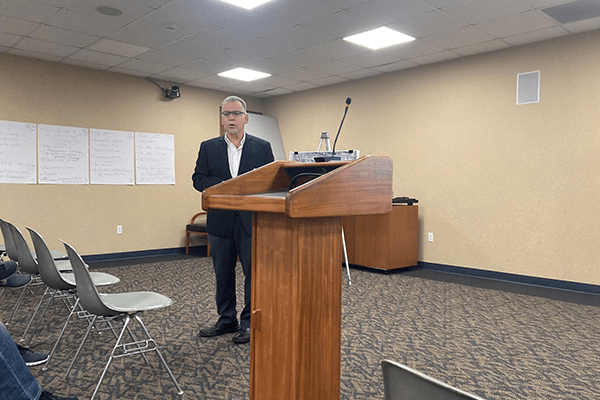|
RCBJ-Audible (Listen For Free)
|
Architect Michael Shilale, Hired To Assess Land, Led Visioning Sessions In Clarkstown
By Tina Traster
The session was long and boisterous – the second held last week – to field suggestions for the future of the Rockland Country Day School campus, which Clarkstown purchased in 2018 for $4.4 million.
Michael Shilale, the architect hired last May for a fee capped at $27,000 to assess the land for development, led both “charrettes”, along with town planner Joe Simoes, to take the temperature of the community and to listen to what “stakeholders” hope will or will not happen on that land.
Nearly 100 people attended the 6 pm session, adding their ideas to wish lists hanging on the walls. Those who live within 1,000 feet of the property, which runs along Kings Highway, were notified about the session by mail. There appeared to be a consensus that the community does not want to see dense housing; many rallied for open space and parkland. Other suggestions included a dog park, hockey rink, art studio, farming, walking trails, childcare, sustainable gardens, pickleball courts.
What’s unknown, however, is what return the town needs to get from the land it purchased in 2018 from the Rockland Country Day School. Questions about the economic needs remained unanswered in the session. For the first two years after the purchase, the nonprofit school, which was tax exempt, was paying a fee to the town to lease back the land it sold. Ultimately the school shuttered in 2019, leaving the town to scramble for new tenants.
Rockland Country Day School closed after 60 years due to falling enrollment and financial woes and declared Chapter 7 bankruptcy.
Asked why the school was purchased in the first place, Hoehmann said, “We were approached by a realtor when the property was first going on the market, and we were not going to let it go on the open market.”
Asked “why” by RCBJ, Hoehmann said because of the “climate” at the time. Asked to clarify that answer, the Supervisor said “economic,” though 2018 was before the pandemic and banking crisis so it is unclear what economic issues were of concern to the supervisor.
What’s also been fuzzy and a source of great contention for neighbors of the Congers campus is what promises elected officials made when the land was bought.
Two years ago, after hiring Shilale to draw up plans for senior housing, Clarkstown intended to move ahead to rezone a portion of the Rockland Country Day School site to allow either affordable senior housing or housing for volunteer fighters or EMT workers. Amid a storm of protest over residential building on site, the town council retreated, tabling the proposal.
At last week’s session, Hoehmann and Councilman Michael Graziano tried to quiet fears, particularly with the election approaching in November, by saying there are “no plans,” for the 22-acre site. Some angry residents said that characterization conflicted with recent efforts to evaluate senior housing options.
The town in May hired Michael Shilale Architects LLP of New City to perform a feasibility study for “new housing and building reuse” on the Rockland Country Day School property. Shilale, an architect who has worked on several projects in the county, will prepare preliminary drawings to review options for site and building layouts. His firm has been hired to review zoning challenges for the site.
Graziano added that the town has fiscal responsibility for the site, adding “how do we get the money back?” The Town has been expecting funds from Champlain Hudson Power Express project, known as CHPE or pronounced “chippy”. The 333-mile, 1000-Megawatt transmission facility to be built by Transmission Development Inc. (TDI) will disrupt portions of Clarkstown, as well as Stony Point and Haverstraw. Once power purchase agreements are in place, financing will be provided primarily by the powerhouse private equity investment firm Blackstone Group, LP.
Simoes confirmed the town has not been paid any from the CHPE project, but also said it has not bonded on the property either.
The site, which has seven acres of wooded property, and six acres of developed property is partly in the R-22 single-family housing zone and partly in the R-40 zone. Planner Simoes said the maximum development for single-family homes would top out at twenty-three. The site has eight structures, with the 1960s Upper School appraised for $1.2 million, the Gym, Café and Elementary School appraised at $2.1 million, the administration building appraising at $1.2 million, the Steam Lab Building appraising at $400,000, and some additional smaller structures.
While the appraisals are valuable for resale, knocking down these older, asbestos-laden buildings are prohibitively costly, which puts the town in a bind to figure out whether it’s best to repurpose these structures or sell them off.
Clarkstown resident Nicholas DiSantis said he wants the town to dedicate the parcel for parkland. “The original resolution says the land was being bought for ‘general municipal purposes.’ Housing was never mentioned.”
At least two residents asked the town to consider a replacement for West Roc, the former popular sports club that was sold and converted into self storage space units in New City.
“People say (sports) fields don’t generate money but that’s not true, “said Andrew Josephs, adding that fields used for baseball, soccer and others youth sports can be monetized. “I have no interest in having high density housing.”
But other residents pointed out that artificial turf fields and nighttime lighting create other problems such as noise, traffic, and light pollution.
Ultimately, the Town of Clarkstown may integrate some of the amenities suggested by residents but it seems likely some portion of the land will be used for development of housing for either seniors or first responders because the parcel is too valuable to be left vacant. Unless, of course, Rockland County opts to buy it with Open Space Acquisition Program money. That’s the question CUPON is asking.













